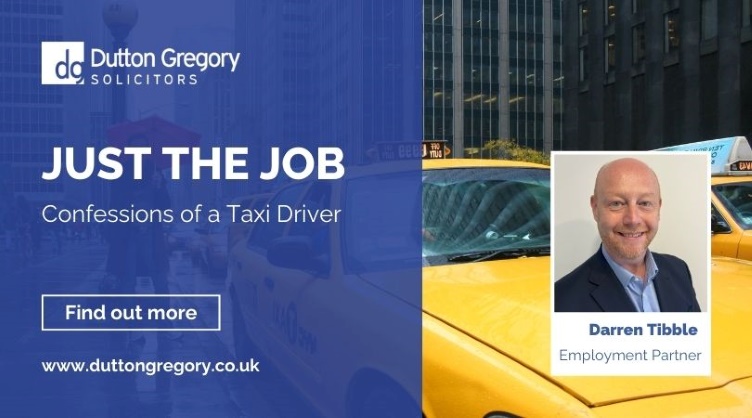“I was getting into my car, and this bloke says to me, ‘Can you give me a lift?’ I said, ‘Sure, you look great, the world’s your oyster. Go for it.’”
Tommy Cooper

CONFESSIONS OF A TAXI DRIVER
I have a confession to make. Contrary to the common and somewhat clichéd view that all solicitors come from a privileged background and all that they’ve done in their career is work in the law; well, let’s just say that I’ve had a few…. interesting… jobs in the past.
I plan to reveal all of them throughout my future blogs. However, I thought that I would start with the fact that I once navigated the streets of Blackpool in a clapped-out taxi to pay my way through law school.
Picture this: a young (with hair), eager taxi driver picking up fares and dishing out advice on everything from the best fish and chips in town to mediating disputes over who had the rights to the front seat. Although those years are well behind me now, I’d like to think that I picked up a few tips (pardon the pun) about negotiation, conflict resolution, and human nature to help me as an employment lawyer.
Now, if only I had a case to tell you about which involves taxi drivers…
FARE PLAY
This week’s case looks at the recent case of Augustine v Data Cars where the Employment Appeal Tribunal considered an interesting point about part-time discrimination.
The claimant was a part-time taxi driver who worked for Data Cars. He was required to pay a flat weekly circuit fee of £148, identical to the fee paid by full-time drivers, regardless of the hours worked. The claimant alleged that this amounted to discrimination against part-time workers because he had to pay the full fee each week, which he felt was unfair given his reduced working hours.
The employment tribunal dismissed his claim, stating that he had not established less favourable treatment compared to a full-time worker since both were subject to the same fee. Furthermore, the tribunal concluded that even if less favourable treatment had been established, the fee was not charged solely because he was a part-time worker.
The Employment Appeal Tribunal's Findings
The Employment Appeal Tribunal (EAT) reviewed the case and agreed with the tribunal's outcome, but for different reasons. The EAT noted the following:
Different Proportional Impact: By charging a flat fee to all drivers, Data Cars was not treating part-time and full-time drivers the same way. Part-time drivers like the claimant, who worked fewer hours, ended up with proportionately less take-home pay after the fee was deducted compared to his full-time counterparts.
Ground of Treatment: The EAT considered whether this less favourable treatment was due to the claimant being a part-time worker. While the EAT's view was that the correct test should be whether part-time status was an effective cause of the treatment, it adhered to the precedent set by the Scottish Court of Session in McMenemy v Capita Business Services. This case dictated that less favourable treatment must be solely on the ground of being a part-time worker to be considered discriminatory. The tribunal had therefore been correct to apply the ‘sole reason’ test (although it had made an error in the way it had done so). The EAT found this error did not alter the outcome: the claim should fail.
BAGGED FOR LIFE
In other employment-related news, I read a recent story about a night shift assistant at Sainsbury's in Romford, who was dismissed after nearly 20 years of service for not paying for "bags for life" while shopping after his shift. He claimed to have unintentionally clicked the "zero bags used" option on the till due to tiredness, despite CCTV showing him taking multiple bags. His shopping amounted to £30, excluding the unpaid bags. Sainsbury's conducted disciplinary action and terminated his employment, citing dishonesty and theft. At an employment tribunal, the former employee claimed that he was unfairly dismissed, but his claim was unsuccessful.
What a retail of woe…
Until next time.
Darren








